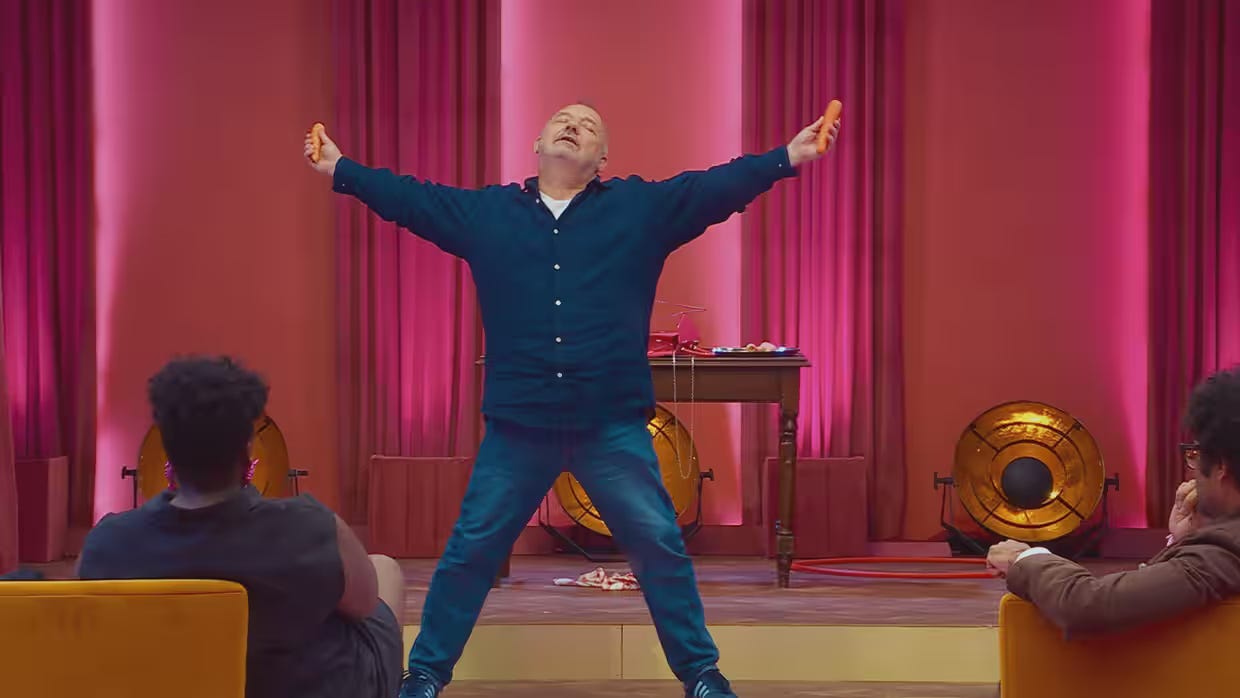It’s always good to laugh. It’s a cleanse of the soul that can occur for so many different reasons, in so many different forms and in so many different ways. Aside from injecting it into your being via the means of television, the most common occurrences are within our everyday lives. Maybe a stranger tripped innocuously at work and you were the only witness. Maybe it was in fact a known colleague who tripped in front of many other colleagues - some will laugh, some will worry. Actually, most would laugh.
Earlier this month as I opened the Prime Video app for the weekly dose of the latest Reacher my wife and I enjoy (and so should you), and during a break in proceedings I was presented with relentless previews of Last One Laughing: Ireland. Spotting Graham Norton as the host meant I should tread carefully, and the preview heeded even further warning: comedians who were simply failing to make each other laugh through the use of cringy costumes and face pulling.
And so when a far more hyped up preview came along just days later, I didn't think I'd like Last One Laughing: UK or even consider it. The comedians involved, both presenting and competing, are amusing panel show fodder for the most part on our screens, and all at some point have tickled me at some point on various Channel 4 based formats. But the deciding factor to go ahead with Last One Laughing: UK was my favourite contestant of the bunch, and someone that over the past 30 years or so has never failed to make me laugh - Bob Mortimer.
Still, the apprehension remained that in the wrong hands a group of comedians trying not to laugh at each other's jokes might be, just like the Ireland edition preview, a bit cringeworthy and ultimately a failure. The premise, a format that started back in 2016 with the Japanese show Documental, of which Last One Laughing is derived from, is that ten comedians are placed together in a lounge area with a six-hour time limit to make each other laugh. They can only laugh twice before being eliminated, using the football yellow/red card punishment system to govern. The host watches all proceedings on multiple cameras in the room next door, where eliminated contestants then join the host until the competition’s conclusion, finally free to have a few laughs without constraints. I was very pleased that the previews gave me the wrong impression. It turns out Last One Laughing: UK is one of the funniest comedy series in years.
The lack of structure and forced improvisation means that these comics we all often watch in pre-written and guided formats really show what they’re made of. Many of my favourite elements of Bob Mortimer’s comedy, from The Smell of Reeves of Mortimer, Shooting Stars to the more recent House of Fools and Athletico Mince podcast with Andy Dawson, is how everyone involved is trying to suppress their laughter throughout but remains in the edit. Knowing the performers are genuinely enjoying their own jokes is a pleasing feeling. As a frequent watcher of series outtakes and bloopers also, this notion simply makes me laugh more as a result. Yes, it may be silly, but also at times painfully funny.
Without hitting spoiler territory too hard, I imagine anyone active on social media or have seen the chat show circuit on television this past week will have seen one of Judy Love’s mishaps. It ranks among the show’s most innocuous yet hilarious moments as Bob grabs a chair to sit round a table gathering for a letter to be read out, and as he sits down, the chair cracks, and the resulting look of pure innocence from Bob towards Judy causes her to explode with laughter. It is a fantastic moment, with Judy’s incredibly infectious laugh hitting a point where everyone around the table has to escape from it. From then on, any doubts over the format, that includes stage performances at irregular intervals from each of the contestants at the judge’s command, the ever-natural host Jimmy Carr, thankfully free of his Hitler-inspired cracker jokes this time around, are over. But is it the format that is king, or its performers?
Prime Video put out the first four episodes of the UK edition on day one, saving the final two for the following week. Eager to fill this new found love as any unfashionable latecomer would, me and my wife reverted back to the badly-previewed Ireland edition to fill the void. Once again, among the names involved are Irish comic tv royalty: Aisling Bea, often a presence on many a Jimmy Carr-helmed show, the energetic Jason Byrne, and many more. Thanks to the UK edition, LOL: Ireland is also picking up in the ratings. Let me be clear right now: the two shows, despite the format and rules being the same, could not be more incomparable in terms of quality.
To be fair to Jimmy Carr, he makes it clear from the outset that he’s prepared to let the contestants push each other to the limits of actual laughter before reading the riot act. There are amusing smirks along the way, and in a few cases some spectacularly close coughs and plenty of pouting. Graham Norton officiates in a manner just the opposite; so much as a hint of a smirk and you’re in the book. Again, spoiler-lite, but many of the yellow cards given are rarely for a fellow comic actually laughing. But I’m not sure what was worse: Norton’s strict refereeing, or the contestant’s attempts to make each other laugh. Where Bob Mortimer will pull out hilarious songs as if out of thin air, or Richard Ayoade going on the attack with a story how he broke his toe fighting a lizard, the Irish comics resort to wearing foam fancy dress on their faces, repeatedly silly costume changes, or putting baked beans in trouser pockets. LOL: Ireland felt more like a group of five year olds left in a creche by their parents, asked to dress up for a play just to keep them occupied for six hours. It is a largely disappointing effort from this usually very funny comedian contingent. If there’s a next time, Ireland, please ask Ardal O’Hanlon. Anyway, back to the main event.
What makes LOL: UK so funny are those aforementioned near misses. Anyone can laugh as much at an imperfect performance as you can a perfected and rehearsed one. The former is of course the more natural laugh - there is something genuine about comedy mishaps even when the material being executed is funny in itself. You're no longer laughing at them, but with them, and for me there is no better humour.
From minute one I knew Richard Ayoade would be a tough nut to crack. I think I’d only ever seen him laugh on television just once before, thanks to John Kearns’ phenomenal routine on 8 out of 10 Cats Does Countdown (28:55 onwards). There is something heart-warming and aesthetically pleasing to see Richard Ayoade laugh. As Sara Pascoe states near the start of the proceedings: "I want to see Richard crack, that would be good television". She isn’t wrong. It is fantastic television.






